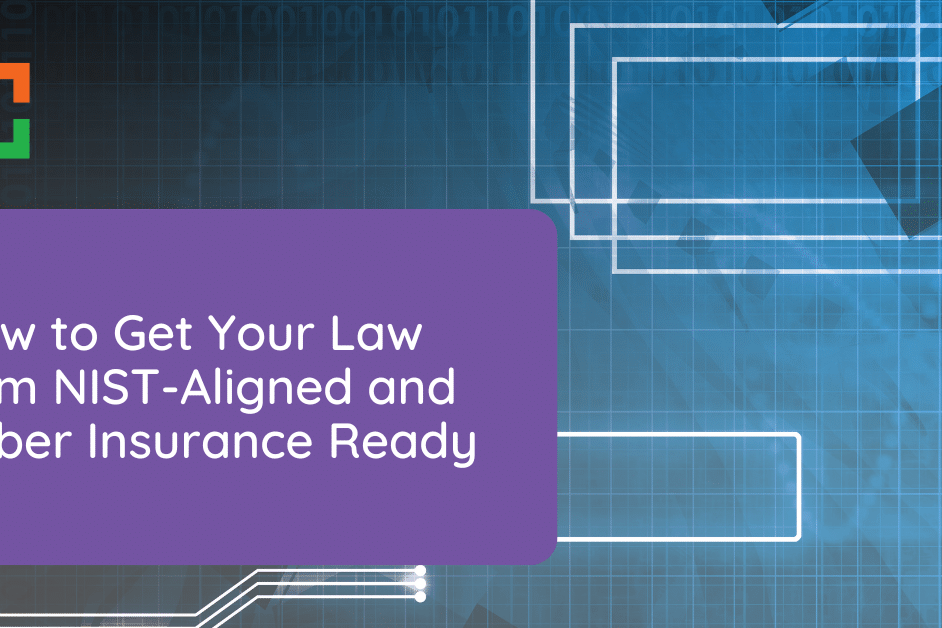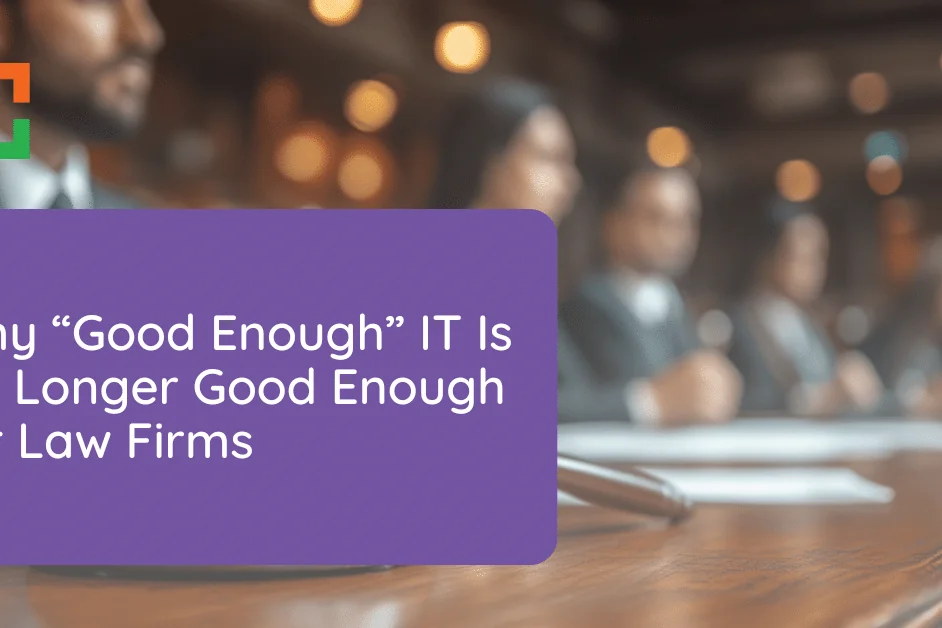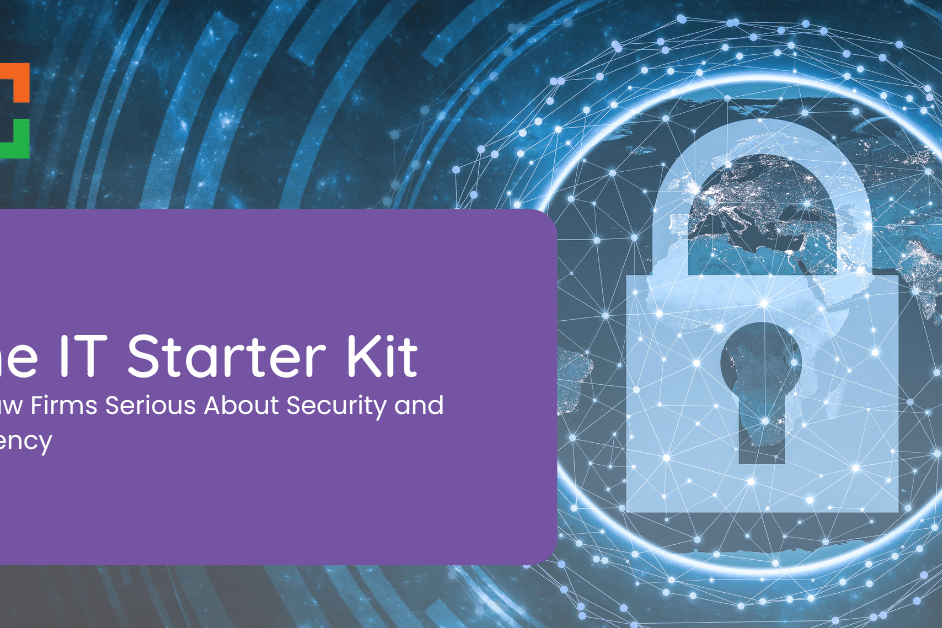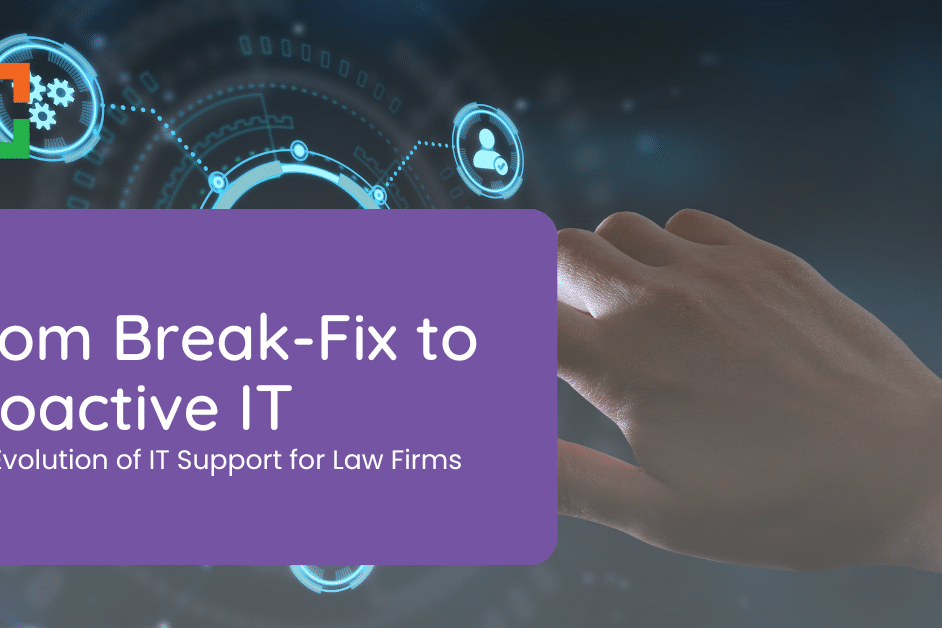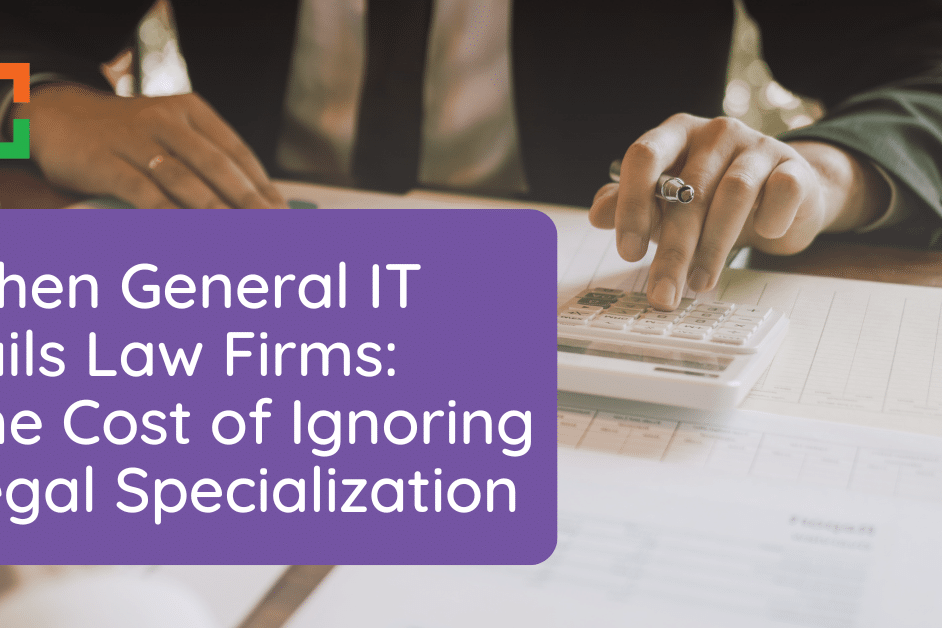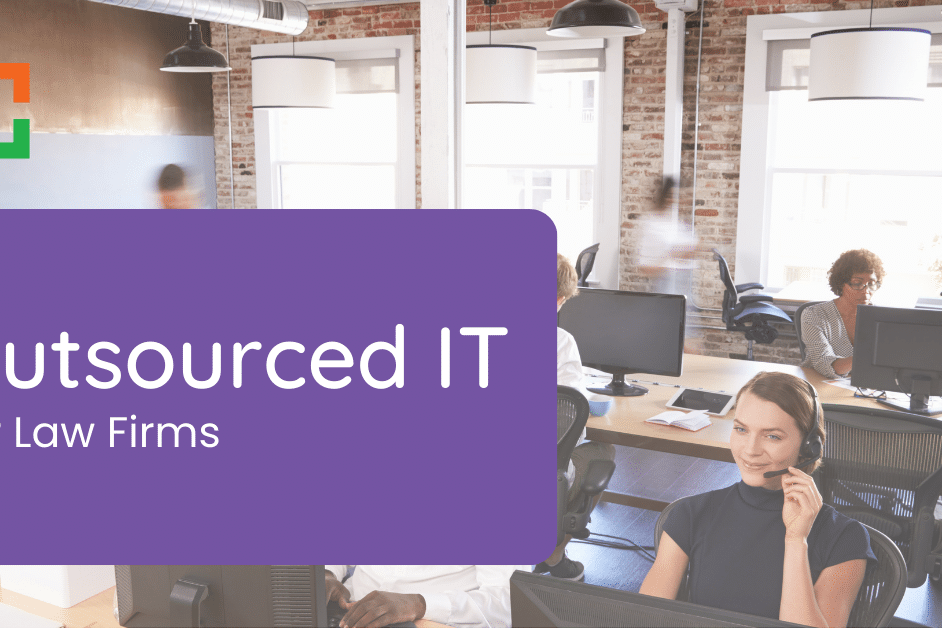Law Firm Disaster Recovery and Business Continuity Planning
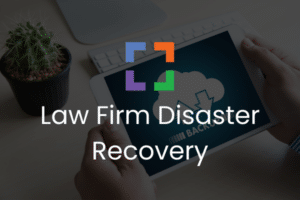 This article on Law Firm Disaster Recovery delves into the essential world of IT support and managed IT services, the unsung heroes in shielding law firms from the chaos of unexpected disasters.
This article on Law Firm Disaster Recovery delves into the essential world of IT support and managed IT services, the unsung heroes in shielding law firms from the chaos of unexpected disasters.
Here, we unpack a step-by-step strategy for crafting, executing, and refining robust disaster recovery plans, highlighting the indispensable role of IT expertise in securing critical data, ensuring seamless operations, and upholding industry compliance.
Through a detailed exploration of risk assessments and the integration of advanced technology solutions, we offer law firms practical advice and innovative strategies to protect their practice in today’s digital landscape.
Discover how IT support isn’t just a safety net but a strategic asset that can elevate your firm’s disaster recovery plan from a mere compliance checklist to a competitive advantage.
In This Article
- Introduction to Law Firm Disaster Recovery & Business Continuity Planning
- Understanding Cybersecurity Threats
- The Role of Managed IT Services in Enhancing Law Firm Disaster Recovery
- Developing a Law Firm Disaster Recovery Plan with IT Support
- Finding the Right Support for Your Law Firm Disaster Recovery
- Frequently Asked Questions - Law Firm Disaster Recovery
Introduction to Law Firm Disaster Recovery & Business Continuity Planning
In the high-stakes world of legal services, where the protection of sensitive data and the assurance of operational continuity are not just best practices but mandates, the importance of disaster recovery and business continuity planning cannot be overstated.
Imagine, for a moment, the chaos that ensues when a law firm is hit by an unexpected cyber-attack, or when natural disasters disrupt the very fabric of daily operations. The repercussions are not just operational but can deeply impact client trust, financial stability, and the firm’s reputation.
Enter the realm of Law Firm Disaster Recovery and Business Continuity Planning—a strategic blueprint that not only prepares law firms to face these unforeseen challenges head-on but also ensures they emerge on the other side, resilient and stronger.
This isn’t about if a disaster will strike, but when; and the readiness of your firm to navigate these turbulent waters will define its future.
However, it’s not all doom and gloom.
With the right approach to disaster recovery and business continuity planning, law firms can turn potential crises into manageable situations. This involves a comprehensive strategy that encompasses not just the recovery of lost data, but the continuation of essential services and the preservation of critical client information—no matter what comes your way.
As we delve deeper into the nuances of crafting an effective disaster recovery and business continuity plan, remember: the goal is not just to survive the storm but to navigate through it with confidence, ensuring your firm’s operations are unscathed and your clients’ faith is unwavering.
Stay tuned as we explore how IT support and managed IT services become your allies in this critical mission, offering the expertise, tools, and strategies to safeguard your practice in today’s volatile landscape.
Related – IT Support for Law Firms: Having readily-available support relieves the burden and stress of law firms’ technology stack. Learn more.
Understanding Cybersecurity Threats
In today’s digital age, where electronic data rivals the value of physical assets, law firms are increasingly becoming targets for sophisticated cybersecurity threats.
These threats have evolved, becoming more complex and cunning in their methods. Cybercriminals specifically target law firms for the treasure trove of sensitive client information they possess, from personal details to confidential business intelligence.
Phishing Attacks
These insidious attacks often manifest as misleading emails that appear to come from trustworthy sources, aiming to steal sensitive information like login details or client data.
Law firms, with their repositories of confidential information, are prime targets for phishing schemes. The repercussions of such attacks can extend from monetary losses to significant reputational harm.
Ransomware
This malicious software encrypts the victim's data, effectively holding it for ransom.
The stakes are particularly high for law firms: losing access to critical files can interrupt legal processes and jeopardize sensitive cases. Paying the ransom offers no assurance of data recovery, presenting a lose-lose scenario.
Server Failure
The threat of server failure looms large over law firms, with potential causes ranging from hardware malfunctions and software corruption to natural disasters.
The consequences of server failures are severe, disrupting daily operations and risking the loss of vital legal documents and client data. This underscores the importance of robust data recovery and business continuity strategies.
Consider the following chart, which illustrates the implications of server ownership for a law firm over seven years.
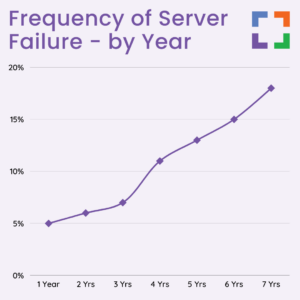
The chart reveals that servers not only demand a significant initial investment but also show an increasing likelihood of failure over time, doubling at the four-year mark and nearing 20% by the seventh year.
Data Breaches
Breaches can stem from external hacking efforts or internal security oversights, leading to legal liabilities, financial repercussions, and eroded client trust.
They often result from inadequate security measures, unaddressed software flaws, or subpar network protections.
Advanced Persistent Threats (APTs)
These are stealthy, targeted cyberattacks where an intruder gains and maintains access to a network undetected over long periods.
APTs pose a grave risk by enabling ongoing theft of sensitive information.
Lack of Prompt, Reliable IT Support
In combating cybersecurity threats, swift and dependable IT support is indispensable.
Without it, law firms remain exposed to persistent attacks and lack the means for a quick recovery, amplifying the damage from cyber incidents.
The process flow chart below delineates the steps required for acquiring new software, servers, updates, or general support with on-premise IT support versus the streamlined process and readily available support offered by cloud-hosting solutions.
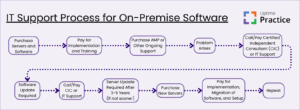
If you decide to pursue a cloud-hosted solution, your setup process is simpler and your IT support is both easily and readily available.
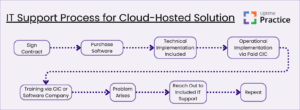
Adopting cloud-hosted solutions simplifies the setup process and ensures that IT support is both easily accessible and efficient.
By embracing these technological advancements, law firms can focus on their core legal duties, confident that their IT infrastructure is not only state-of-the-art but also custom-fitted to their specific professional needs.
Security & Compliance are Non-Negotiable for Law Firms
With Uptime Practice Next, get:
- Multi-Factor Authentication
- Email Encryption
- Compliant Backups
- Desktop Protection
- Ransomware Protection
- and More!
The Role of Managed IT Services in Enhancing Law Firm Disaster Recovery
Managed IT services extend beyond the foundational support for developing a disaster recovery plan; they play a crucial role in enhancing and sustaining the resilience of law firms against disruptions.
This section explores the multifaceted contributions of managed IT services to law firm disaster recovery, emphasizing their role in not just planning but actively reinforcing a law firm’s disaster recovery capabilities.
Proactive Monitoring and Maintenance
One of the standout benefits of managed IT services is their proactive approach to monitoring and maintaining a law firm's IT infrastructure.
Unlike traditional IT support that reacts to issues as they arise, managed IT services employ advanced monitoring tools to detect and address potential problems before they escalate into disasters.
This continuous vigilance helps prevent data loss, system failures, and security breaches, significantly reducing the risk of operational downtime.
Related – Managed IT Services for Law Firms: Outsourcing your IT needs allows your firm to better focus on legal-centric work. Learn how.
Advanced Data Recovery Techniques
Managed IT services employ cutting-edge data recovery techniques that go beyond traditional backup solutions.
Leveraging the latest in cloud disaster recovery (DR) and as-a-service models, they offer law firms rapid, efficient data restoration capabilities. This includes real-time data replication and the ability to roll back to specific points in time before a data loss event occurred, minimizing downtime and data corruption.
Cyber Resilience Strategies
Managed IT services provide specialized cyber resilience strategies tailored to the legal sector.
This includes advanced threat detection systems, end-to-end encryption for data in transit and at rest, and regular security assessments to identify and remediate vulnerabilities. Their expertise in legal technology ensures that these strategies are compliant with industry-specific regulations and standards.
Related – Cybersecurity for Law Firms: Cybersecurity should always be at the forefront of law firms’ minds and strategy. Learn how.
Incident Response Planning and Forensics
Managed IT services extend their role to include incident response planning and forensic analysis following a cybersecurity incident.
This ensures that law firms not only recover from such events but also gain insights into attack vectors, perpetrator tactics, and system vulnerabilities. This forensic analysis is crucial for refining disaster recovery strategies, improving security postures, and fulfilling any legal obligations related to the incident.
Customized Business Continuity Consulting
Finally, managed IT services offer customized business continuity consulting, aligning IT disaster recovery strategies with the broader business continuity goals of the law firm.
This holistic approach ensures that technology recovery plans are seamlessly integrated with operational, financial, and client service continuity strategies, providing a comprehensive resilience framework for the firm.
By focusing on these advanced and specialized contributions, managed IT services play a critical role in not just supporting but significantly enhancing law firm disaster recovery efforts.
Their expertise and technologies ensure that law firms are not only prepared for disasters but are also positioned to recover with agility and minimal impact on their operations and client services.

Uptime Practice was a true miracle when the pandemic struck. We moved to Uptime Practice and were working immediately.
Todd Tracy – The Tracy Law Group, PLLC
Developing a Law Firm Disaster Recovery Plan with IT Support
Crafting a disaster recovery plan is akin to preparing for a trial: it requires meticulous planning, an understanding of potential challenges, and a strategy tailored to the unique needs of your practice.
In this critical endeavor, IT support and managed IT services play a pivotal role, offering the expertise and tools necessary to ensure your law firm is prepared for any disaster.
Here’s how to develop a robust disaster recovery plan with the support of IT professionals.
Conduct a Comprehensive Risk Assessment
The first step in developing a disaster recovery plan is understanding the risks your law firm faces.
IT support teams conduct thorough risk assessments, identifying potential threats ranging from cyber-attacks and data breaches to natural disasters and power outages. This process involves evaluating the likelihood of each scenario and its potential impact on your firm’s operations, ensuring that the plan addresses the most critical vulnerabilities.
Business Impact Analysis (BIA)
Following the risk assessment, a Business Impact Analysis (BIA) is essential to pinpoint which systems and processes are vital to your firm’s day-to-day operations.
IT professionals help determine the maximum acceptable downtime for each critical function and the minimum resources required to resume operations. This step prioritizes the recovery efforts, focusing on restoring the most crucial services first to minimize operational disruptions.
Strategy Formulation
With a clear understanding of the risks and their potential impact, the next step is to formulate a disaster recovery strategy.
This involves deciding on the specific IT solutions and protocols that will be implemented to ensure data recovery and business continuity.
IT support and managed services provide invaluable insights into the most effective strategies, whether it’s implementing off-site data backups, cloud computing solutions for remote access, or redundant systems to ensure continuous operations.
Plan Documentation and Implementation
A well-documented disaster recovery plan is crucial for effective implementation.
This document should outline the steps to be taken before, during, and after a disaster, including contact lists, vendor information, and detailed recovery procedures. IT support teams assist in creating this comprehensive guide, ensuring that it is accessible and understandable to all key personnel within the firm.
They also play a key role in implementing the necessary technology solutions and ensuring that all systems are configured correctly for rapid recovery.
Training and Awareness
For a disaster recovery plan to be successful, everyone in the firm must understand their role in its execution.
IT support can provide training sessions and simulations to ensure that staff are prepared to respond effectively in the event of a disaster. This includes educating employees on cybersecurity best practices, the steps to take in the immediate aftermath of a disaster, and how to access and use backup systems and data.
Regular Testing and Updates
A disaster recovery plan is not a set-and-forget solution; it requires regular testing and updates to ensure its effectiveness.
IT support teams conduct periodic drills to simulate disaster scenarios, testing the plan’s components and making adjustments as needed. They also review the plan regularly to incorporate any changes in the firm’s operations, technology advancements, or emerging threats, ensuring that the plan evolves to meet new challenges.
Developing a law firm disaster recovery plan with IT support is a strategic process that ensures your firm is equipped to handle any disaster with resilience and agility.
By leveraging the expertise of IT professionals, law firms can create a robust framework for disaster recovery that protects critical data, maintains operational continuity, and upholds the trust of their clients.
Would You Rather: Serve Clients or Manage IT?
Use Uptime Practice Next for:
- Unlimited IT Support
- Legal Software Consultation
- Cloud Storage
- Security Protection
- Data Backups
- and More!
Finding the Right Support for Your Law Firm Disaster Recovery
After laying the groundwork for a comprehensive disaster recovery and business continuity plan, the critical next step is securing the right IT support and managed services to bring these plans to fruition.
This journey involves identifying partners who not only understand the unique needs of the legal sector but also possess the expertise to address the specific challenges your firm faces.
Here’s how to navigate the process of finding the right support for your law firm’s disaster recovery and business continuity efforts.
Assess Your Firm’s Specific Needs
Before embarking on the search for IT support, take a thorough inventory of your law firm’s specific needs.
Consider factors such as the size of your firm, the complexity of your IT infrastructure, the nature of the data you handle, and your compliance requirements. Understanding these elements will help you identify IT support and managed services that specialize in areas relevant to your firm’s operations.
Look for Industry-Specific Experience
The legal sector comes with its own set of challenges, regulations, and expectations.
It’s crucial to partner with IT support providers who have a deep understanding of this landscape. Look for providers with proven experience in the legal sector, as they will be more equipped to tailor their disaster recovery and business continuity solutions to meet industry-specific standards and best practices.
Evaluate Their Expertise in Disaster Recovery and Business Continuity
When assessing potential IT support partners, delve into their expertise and track record in disaster recovery and business continuity.
Ask for case studies or references that demonstrate their ability to plan, implement, and manage effective disaster recovery strategies. This includes their approach to risk assessment, data backup and recovery, cybersecurity, and emergency response.
Consider the Scope of Services Offered
The right IT support provider should offer a comprehensive suite of services that cover all aspects of disaster recovery and business continuity planning.
This includes not just reactive measures like data recovery services but also proactive strategies such as regular system audits, cybersecurity training for staff, and ongoing consultation to keep your plan aligned with evolving threats and technologies.
Assess Their Commitment to Partnership
Effective disaster recovery and business continuity planning is an ongoing process, not a one-time setup.
The right IT support provider should view their relationship with your firm as a partnership, showing a commitment to regular communication, updates, and plan testing. Evaluate their willingness to understand your firm’s evolving needs and to adapt their services accordingly.
Check for Scalability and Flexibility
As your law firm grows and evolves, so too will your disaster recovery and business continuity needs.
Ensure that the IT support providers you consider can scale their services to match your firm’s growth and are flexible enough to adjust to changing requirements. This scalability and flexibility are crucial for maintaining an effective disaster recovery strategy over time.
Initiate a Dialogue
Finally, initiate a dialogue with potential IT support providers.
This conversation should go beyond technical capabilities and service offerings to explore how they can support your firm’s broader goals.
The right provider will not only answer your questions but also ask their own, demonstrating a genuine interest in developing a customized solution that aligns with your firm’s objectives.
Finding the right IT support and managed services is a critical step in ensuring the effectiveness of your law firm’s disaster recovery and business continuity plans.
By carefully assessing your needs, evaluating potential partners’ expertise and services, and seeking a true partnership, you can secure the support necessary to protect your firm against the unexpected, ensuring resilience and continuity in the face of any disaster.
Want help? Reach out to us.
IT Services for Law Firms - Frequently Asked Questions
Law firm disaster recovery involves strategies and processes that enable a legal practice to recover from any disruption, such as cyberattacks, natural disasters, or technical failures, ensuring continuity of operations and protection of sensitive data.
Disaster recovery planning is critical for law firms to safeguard sensitive client information, maintain operational continuity, comply with legal and regulatory requirements, and protect the firm’s reputation in the event of unforeseen disruptions.
A law firm should test its disaster recovery plan at least annually or whenever significant changes are made to its IT infrastructure, legal practice, or when new threats emerge, to ensure the plan’s effectiveness and the firm’s preparedness.
The main components include a risk assessment, business impact analysis, recovery strategies for IT and communications, detailed recovery procedures, employee training programs, and regular plan testing and updates.
Law firms can protect against cyber threats by implementing robust cybersecurity measures such as regular employee training, advanced email filtering, up-to-date antivirus software, multi-factor authentication, and regular security audits.
IT support plays a crucial role in designing, implementing, and maintaining the disaster recovery plan, providing technical expertise, managing cybersecurity measures, ensuring data backups, and facilitating quick recovery in the event of a disaster.
Yes, cloud computing can enhance a law firm’s disaster recovery plan by providing scalable, flexible, and cost-effective solutions for data backup, storage, and recovery, ensuring access to critical data and applications from any location.
Following a data breach, law firms should immediately activate their incident response plan, which includes isolating affected systems, assessing the scope of the breach, notifying affected clients and authorities as required, and taking steps to secure their systems against further attacks.
Business continuity planning focuses on maintaining all aspects of a law firm’s operations during a disruption, while disaster recovery specifically targets the restoration of IT and data access. Both are essential components of a comprehensive resilience strategy.
Employee training is important because staff awareness and adherence to security protocols significantly reduce the risk of incidents such as data breaches and ensure that employees know how to respond effectively in the event of a disaster, minimizing downtime and data loss.
Uptime Practice:
The IT & Cloud Platform for Law Firms.
Uptime Practice is a suite of Managed IT and cloud services, made exclusively for law firms.
Practice Next
Technology + Legal Software Support for Modern Law Firms
Practice Next is a suite of Managed IT, Legal Software Support, and Cloud Essentials, made just for law firms.
-
Practice Next is a suite managed IT, technology essentials and legal software support.
-
Practice Next includes unlimited IT and legal software support, Microsoft 365, legal-centric cloud storage and more.
-
Practice Next pairs great with cloud-based legal software such as Clio Manage, CosmoLex, MyCase and more.
Practice Go
Cloudify Your Legal App
Does your law firm already have a cloud strategy, but have one premise-based application still running on onsite servers? Practice Go is for you.
- With Practice Go, we effectively turn your desktop/server- based legal software into a cloud application (a Published App), freeing your firm from the limitations of traditional software.
- Practice Go can cloudify your PCLaw, Time Matters, Tabs3, ProLaw, Juris, QuickBooks and more.
Practice Foundation
Complete Private Cloud for Law Firms
If your law firm needs a central, secure cloud platform for all of your legal software, documents and data, Practice Foundation is for you.
-
Practice Foundation is an end-to-end cloud platform that will host all of your firm's applications and documents, and will optionally include Office 365 + unlimited IT support. Everyone in your firm logs into a Virtual Desktop where they'll find all of their apps and docs.
-
Practice Foundation works with PCLaw, Time Matters, Tabs3, ProLaw, Juris, QuickBooks, Timeslips, TrialWorks, Adobe Acrobat and more.
Not Sure Which Edition You Need?
No problem. Check out our quick Comparison Chart for Uptime Practice, or Get in Touch to talk with our sales team.

Dennis Dimka
As the founder and CEO of Uptime Legal Systems, I've had the privilege of guiding our company to become a leading provider of technology services for law firms.
Our growth, both organic and through strategic acquisitions, has enabled us to offer a diverse range of services, tailored to the evolving needs of the legal industry.
Being recognized as an Ernst & Young Entrepreneur of the Year Finalist and seeing Uptime Legal ranked among the Inc. 5000 list of fastest-growing private companies in America for eight consecutive years are testaments to our team's dedication.
At Uptime Legal, we strive to continuously innovate and adapt in the rapidly evolving legal tech landscape, ensuring that law firms have access to the most advanced and reliable technology solutions.
Related Posts
August 22, 2025
How to Create a Disaster Recovery Plan for Your Law Firm
January 20, 2025
5 IT Mistakes that Expose Law Firms to Cyber Threats
September 26, 2024
Outsourced but Onshore: Navigating Law Firm IT Regulations
June 27, 2024
The Impact of Remote Work on Law Firm IT
May 29, 2024
The Real Value of Legal Specialty in IT Services
April 24, 2024
Comparing Types of IT Providers for Law Firms
February 22, 2024
Types of IT Services for Law Firms
February 8, 2024
Legal Data Management & Storage Solutions for Law Firms
February 1, 2024
How to Choose the Right IT Provider – A Guide for Law Firms
January 9, 2024
VoIP for Law Firms
December 15, 2023
Cybersecurity for Law Firms
December 8, 2023
Managed Cloud Services for Law firms
November 15, 2023
Outsourced IT for Law Firms
November 9, 2023
Managed IT Services for Law Firms
October 11, 2023
IT Support for Law Firms
June 17, 2019
Law Firm IT – What Are Your Options?
June 10, 2019




